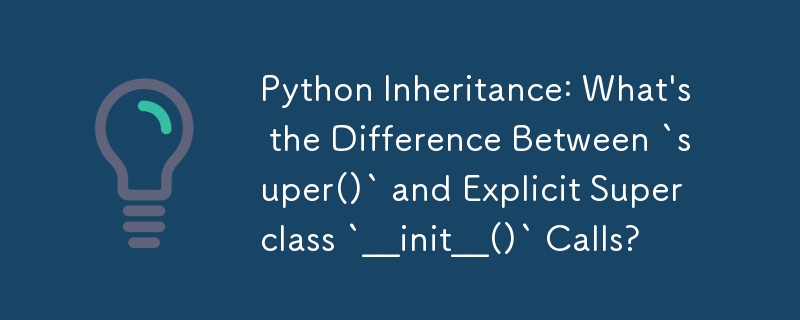Home >Backend Development >Python Tutorial >Python Inheritance: What's the Difference Between `super()` and Explicit Superclass `__init__()` Calls?
Python Inheritance: What's the Difference Between `super()` and Explicit Superclass `__init__()` Calls?
- Linda HamiltonOriginal
- 2024-12-13 09:09:13856browse

What is the Distinction Between 'super' and Explicit Superclass __init__()?
In Python, the super keyword provides a convenient way to access the parent class's methods. Let's explore its usage and contrast it with the explicit method of calling the parent's __init__ method.
Explicit Parent Class Initialization
class Child(SomeBaseClass):
def __init__(self):
SomeBaseClass.__init__(self)
This form of inheritance explicitly calls the __init__ method of the parent class, SomeBaseClass. It tightly couples the child class to that specific parent and assumes that the parent's __init__ method will always exist.
'super' Initialization
class Child(SomeBaseClass):
def __init__(self):
super().__init__()
The super keyword allows for a more flexible initialization process. It ensures that the __init__ method of the parent class that follows the child class in the Method Resolution Order (MRO) is invoked. This enables the possibility of having multiple inheritance or adding additional base classes without affecting the child's initialization.
Python 2 vs. Python 3
In Python 2, the syntax for using super is different:
super(Child, self).__init__()
However, in Python 3, this can be simplified to:
super().__init__()
Advantages of Using 'super'
- Forward compatibility: Using super allows for changes in the class hierarchy without breaking compatibility.
- Dependency injection: It enables the possibility of injecting additional functionality into the initialization process through subclasses.
Conclusion
While the explicit SomeBaseClass.__init__(self) call may suffice in simple inheritance scenarios, it can become limiting in more complex class hierarchies. The super keyword provides greater flexibility, forward compatibility, and support for dependency injection. Hence, it is recommended to use super for initializing parent classes, as it enhances code maintainability and reusability.
The above is the detailed content of Python Inheritance: What's the Difference Between `super()` and Explicit Superclass `__init__()` Calls?. For more information, please follow other related articles on the PHP Chinese website!

